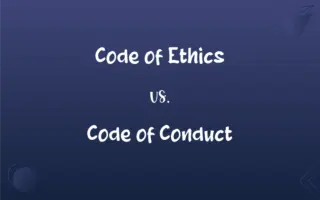Part With vs. Part From: What's the Difference?
Edited by Aimie Carlson || By Harlon Moss || Published on November 22, 2023
"Part with" means to give up or let go of something, often reluctantly, while "part from" means to leave or separate from a person or place.

Key Differences
"Part with" and "part from" are English phrases that, while sounding similar, serve distinct purposes in communication. The phrase "part with" typically implies a sense of relinquishment or letting go of a possession or something of value. Whether it's an object, money, or an abstract idea, to "part with" something suggests a certain level of attachment or importance to the speaker.
On the contrary, "part from" leans more towards the idea of separation or departure from a person, place, or situation. It captures the essence of leaving behind, often with the undertones of emotion or significance associated with the entity one is separating from.
In casual conversations, one might hear "part with" when discussing items for sale or trade. For instance, an individual might be hesitant to "part with" a cherished childhood toy. This highlights the emotional or sentimental value attached to the object in question.
Alternatively, "part from" is more commonly used in scenarios of goodbyes or departures. Someone may find it hard to "part from" a loved one or a familiar place. This usage emphasizes the bond or connection between the individual and the entity they are leaving.
Comparison Chart
Primary Meaning
To give up or relinquish
To leave or separate from
ADVERTISEMENT
Common Usage
Relates to objects, money, or abstract ideas
Often pertains to people, places, or situations
Tone
Implies reluctance or value
Connotes emotional or physical separation
Example
Parting with money
Parting from a friend
Grammar
Phrasal verb used with objects
Phrasal verb used with people or places
Part With and Part From Definitions
Part With
To trade or exchange.
Would you part with your guitar for $500?
ADVERTISEMENT
Part From
To detach or move away.
The child didn't want to part from her mother on the first day of school.
Part With
To sell or hand over something.
He decided to part with his old car.
Part From
To diverge or go in different directions.
The rivers part from a common source.
Part With
To relinquish or let go.
She finds it hard to part with her books.
Part From
To leave or separate from a person or place.
It's always hard to part from family.
Part With
To bid farewell to a cherished item.
It's tough for collectors to part with rare items.
Part From
To say goodbye or take leave.
Tomorrow, I must part from this beautiful city.
Part With
To give up possession of something.
I cannot part with my grandmother's necklace.
Part From
To end a relationship or association.
They decided to part from the company after a decade.
FAQs
Can "part with" be used for people?
Typically, "part with" is used for objects or ideas, not people.
Can "part from" be used in the context of ideas?
Rarely. "Part from" typically refers to people or places.
Does "part from" imply a permanent separation?
Not necessarily. "Part from" can be temporary or permanent.
Is "part with" related to selling things?
It can be, especially if one is giving up something of value.
Can "part from" imply divergence in paths?
Yes, like rivers "parting from" a common source.
Can "part from" mean ending a partnership?
Yes, it can mean ending a business or personal partnership.
Is "part with" formal English?
It's standard English and can be used in both formal and informal contexts.
Can "part from" imply disagreement?
Yes, as in "parting from someone's opinion."
Is "part with" always reluctant?
Often, but not always. The context determines the sentiment.
Can you "part with" a memory or thought?
Yes, "part with" can refer to abstract concepts, including memories or thoughts.
Can businesses "part with" assets?
Yes, businesses can "part with" assets, implying they're selling or relinquishing them.
What's an antonym for "part with"?
"Retain" or "keep" can be antonyms.
Can "part from" be used with abstract concepts?
It's less common but possible, especially in poetic or metaphorical contexts.
Is "part from" synonymous with "break up"?
In some contexts, like ending a relationship, they can be synonymous.
Is "part from" always emotional?
Often it carries emotional undertones, but context determines its depth.
Does "part from" always imply physical distance?
Not always. It can also imply emotional or metaphorical distance.
Can you "part with" feelings?
Yes, it can be used metaphorically, as in "parting with one's fears."
What's a synonym for "part from"?
"Depart from" or "leave" can be synonyms.
How is "part with" different from "give away"?
"Part with" often implies reluctance, while "give away" doesn't necessarily.
Can "part with" imply a trade?
Yes, it can imply exchanging one thing for another.
About Author
Written by
Harlon MossHarlon is a seasoned quality moderator and accomplished content writer for Difference Wiki. An alumnus of the prestigious University of California, he earned his degree in Computer Science. Leveraging his academic background, Harlon brings a meticulous and informed perspective to his work, ensuring content accuracy and excellence.
Edited by
Aimie CarlsonAimie Carlson, holding a master's degree in English literature, is a fervent English language enthusiast. She lends her writing talents to Difference Wiki, a prominent website that specializes in comparisons, offering readers insightful analyses that both captivate and inform.































































